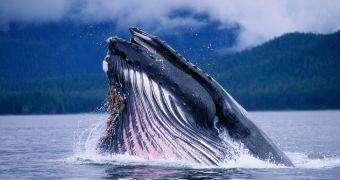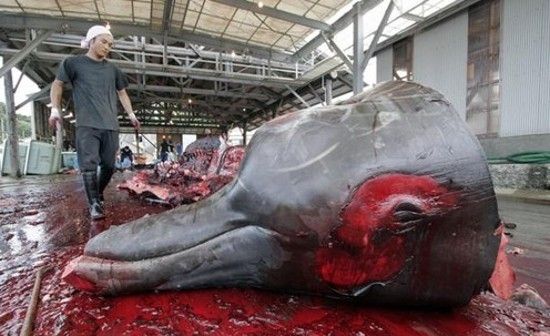As of recently, it seems to me that Japan's supposedly scientific whaling program in the Southern Ocean is much like some band or musician that just can't come to terms with the fact that it is retirement time.
In fact, scratch that. It's more like a band or a musician that is busy planning a huge comeback tour despite the fact that not all that many people really liked their work to begin with.
If you're into conservation – or at least you happen to be a big fan of “Free Willy” and hold whales close to heart – you probably know that Japan's hunts in the Antarctic have been getting loads of media attention these past few weeks.
This is because the International Court of Justice in The Hague, Netherlands, has deemed these hunts illegal, and has asked that Japan end them immediately. However, the country seems anything but willing to do so.
I am no specialist in legal affairs, but it looks to me like Japan is pushing it, and odds are that soon enough, things will blow up in its face. I don't know about you, but I for one would very much like to be around when this happens.
Not to beat about the bush, here is what this editorial boils down to: a few honest thoughts on Japan's whaling program in the Southern Ocean, all sprinkled with information which I hope will help expose the country's yearly hunts for what they really are.
First, Let Us Chat About How These Hunts Usually Go Down
To begin, it must be said that this country first developed a sweet (or should I say bloody) tooth for whale hunts back in the 12th century. However, it was only in the 1980s when it finally got the hang of it and started carrying out whaling activities on an industrial scale.
These days, the country's government issues whaling permits to the Institute of Cetacean Research, and then the latter contracts a company whose vessels and crew take care of tracking down and slaughtering marine mammals.
When Japan first started hunting whales, folks used to guide the animals towards nets, stick them with several harpoons, and then insert either a sword or a wooden plug into their blowhole. These days, however, they use fast ships to stalk them and grenade-tipped harpoon guns to kill them.
It goes without saying that the sight of a whale struggling to swim away or stay alive after having been shot with a grenade-tipped harpoon is not all that pleasant. Not to mention the fact that the bloody mess that gets made when these unlucky marine mammals are butchered is not all that fun to look at either.
I don't want to shock you (OK, maybe I do, but not much – just enough to help really put things into perspective), but here is what happens to whales when the Japanese fleet gets hold of them:
Japan Is an Excellent Legal Hoops Jumper
Some might be tempted to ask why it is that, despite their being this gruesome, Japanese whale hunts are still allowed to continue. Well, the fact of the matter is that, much to the dismay of conservationists, Japan is an excellent legal hoops jumper, and by this, I mean that it has a way of making the law work to its advantage.
Introducing exhibit A: in 1986, the International Whaling Commission implemented a moratorium on commercial whaling activities. Japan is not one to mess with international rules and regulations, so naturally it was quick to abide by this ruling. Sort of.
What it actually did was try and razzle-dazzle people by rolling out so-called scientific whaling programs. The ones that are making headlines these days are JARPA, i.e. the one in the Antarctic, and JARPN, i.e. the one in the North Pacific.
Under the coverage of this “whaling for research purposes” label, the country continued to kill whales, except that it started claiming that it was doing so to be able to better monitor wild populations of various marine mammals species.
For the sake of credibility, these hunts were entrusted to the country's Institute of Cetacean Researcher. With the name this fancy, nobody ever suspected this organization to be carrying out commercial whaling activities while pretending to be busy studying wild whale populations.
Until it was discovered that the meat obtained from whales killed as part of these programs was being served in shops and restaurants, and Australia decided to challenge the validity of Japan's supposed scientific whaling program in the Southern Ocean in court, that is.
Introducing exhibit B: this past March 31, the International Court of Justice in The Hague, Netherlands, ruled that Japan was killing way too many whales in the Antarctic for it to be carrying out research activities alone. Hence, the country was ordered to drop its whaling program in these waters.
Now, if you think cats are impressive, what with their nine lives and their ability to always land on their feet, just wait until you hear about how Japan reacted to the United Nation court's ruling. Spoiler: it managed to find a way to get around it, just like it did with the moratorium on commercial whaling years before. Why? Probably because:
Whale Hunts in the Antarctic – The Comeback Tour
Since the United Nations court's chief objection to its whale hunts in the Southern Ocean was that the country was slaughtering too many marine mammals to just be researching them, Japan is now trying to bend the International Court of Justice's verdict to its advantage by establishing new and somewhat lower quotas.
The trouble with reinventing yourself is that, no matter how hard you try and what crazy outfit you decide to put on hoping to confuse people, folks will still know it's you. Hence the fact that, no matter what quotas the country might set for its whaling fleet in the Antarctic, conservationists will still protest such campaigns and try to have them banned in court.
More so if, just like before, the meat that Japanese whalers get from marine mammals they butcher in this part of the world ends up on people's plates, just like it did before the March 31 ban on the country's Antarctic whaling program.
So Where Are Those Honest Thoughts You Were Promising Us?
Not to rain on Japan's parade or anything (especially not since I have the greatest respect for it for managing to get around the 1986 moratorium and this year's United Nations court verdict), but there is this one thing called common decency, and it seems to me that the country is not all that familiar with this concept, at least as far as whaling activities are concerned.
Granted, the International Court of Justice did not come right out and say that the Japanese whaling fleet had no business messing with whales in the Antarctic, regardless of how many of them it was looking to kill. However, the way I see things, this was very much implied, and Japan should pick up on the hint sent its way.
What's more, I think that, if the country really is as dead set on butchering marine mammals as it appears to be, it might as well own up to it and come out and say that it wants to resume commercial whaling activities, instead of continue to play games and pretend that it is not after what pretty much everybody knows it wants.
Just for the Record
I know I have promised to only stick to Japan's whaling program in the Antarctic, but I feel that I have to tell you that, since the United Nations court did not say anything about the legality of whale hunts in the North Pacific, the country plans to resume such activities sometime later this month.
Granted, the whaling program in the North Pacific is the same as the one in the Southern Ocean, so if the latter was found to be illegal, odds are the same is true for the former, but, since the International Court of Justice did not explicitly ban it, there is no reason not to move forward with it.
Cause, you know, things are not in themselves ethical or unethical. On the contrary, it is labels like “legal” and “illegal” that separate right from wrong, and thank whatever deity one happens to worship – if any, of course – for these labels; otherwise, we would all be at a loss knowing how to behave.

 14 DAY TRIAL //
14 DAY TRIAL // 



